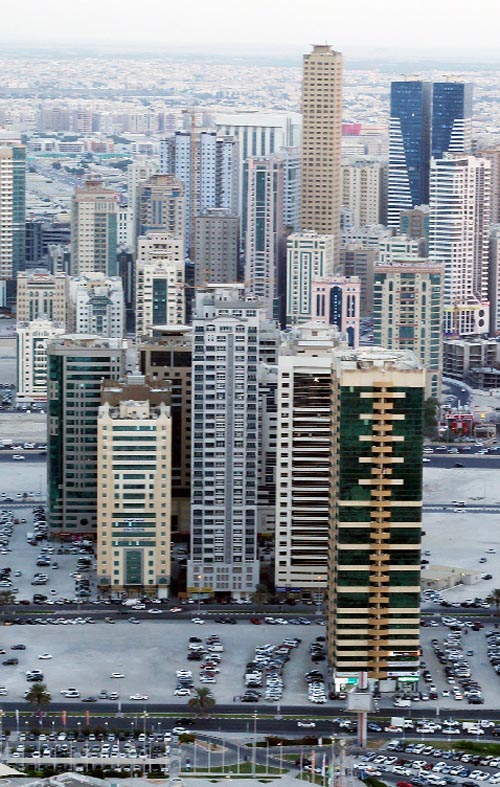If you ask the residents of Sharjah what is on their mind mostly these days, the majority will say “rent ”.
They fear it is only going to go further north. They are also worried about the arm-twisting tactics adopted by some landlords to force tenants to cough up higher rents.
All these have forced residents to asked the government to review the current law and fix a rational rent hike cap replacing the current similarity law which allows the landlords to increase the rents as they want.
They said some of the landlords hike rents by almost double although the buildings are old, as they compare them with the rents in new buildings in the same area.
The residents complained that the landlords are not abiding by the tenancy law — they force tenants to pay between 30 per cent and 45 per cent more even if they haven’t completed the first three years of the protection period.
The tenancy law that was issued on June 6, 2007 by the Sharjah Government has not stipulated a cap, but its articles protect the tenants from an annual hike in rents. As per the current law, the landlords cannot increase the rents before the lapse of first three years since the commencement of the contract, and every two years afterwards.
The residents’ demand to review the law follows an irrational increase in rent of up to 40 per cent in almost all areas in Sharjah. The landlords are demanding higher rents even for old and dilapidated buildings.
For instance, the rent for a one-bedroom-and-a-hall apartment with for window ACs in Al Yarmouk and Al Buteena has gone up to Dh25,000, and that for a similar flat with central or split AC units in Al Buhairah, Al Khan, Al Majaz, and Al Taawun has reached Dh45,000. The rent for a two-bed room apartment in these areas is anywhere between Dh55,000 and Dh65,000, and that for a three-bedroom set ranges from Dh70,000 to Dh100,000 now. The rents are expected to increase more and more, the tenants fear.
Expo bid win, Syrian influx
Speaking to Khaleej Times, real estate offices and landlords, including Bin Majid Real Estate, said that the real estate market is controlled by supply and demand.
A Bin Majid Real Estate official said the influx of Syrians to the UAE, which is perceived as a safe country, and the winning of the World Expo 2020 bid by Dubai have contributed to the rent hikes. “As landlords, we are ready to implement any new tenancy law even if it determines a cap on the rent increase after the completion of the first three years,” he said.
Tenants cry foul
Mohamed Khamis, a physician at a private hospital in Dubai who lives in Al Majaz area of Sharjah, said he hopes the government will bring an amendment in the current tenancy law stipulating different rent hike ceilings for new and old buildings.
Lana Mahdi, a tenant of an Al Khan building, felt such a new law would fight the greediness of landlords who are eying to take away all salaries of poor employees, who only want a decent life, not saving money.
Nittin Kumar, an accountant working in Dubai, said that his landlord in Sharjah increased his rent by 20 per cent despite him having not completed even one year in the apartment. He is caught in a dilemma. “If I accept the hike, I would not be able to benefit from the three-year protection from rent hikes allowed in Sharjah, and if I move out, I would have to pay more in other buildings.”
Similarity law and rent hikes
Salim Al Kabi, Director of the Rent Dispute Committee at the Sharjah Municipality, said the municipality has received a large number of complaints from tenants against their landlords for hiking rents before the completion of the protection period. The committee, based on the tenancy law issued 2007, would give them justice as the landlords have no right to ask tenants more rents before the completion of the protection period. “Even after the completion of the protection period, the landlords would be allowed to increase rent again only after the next two years.”
The municipality is currently studying the real estate market and new changes might be brought about in the future, but as of now, tenants and landlords are obliged to follow the current rules, he said.
The percentage of rent increase is determined based on the similarity of buildings around the area, he explained. The similarity law considers the standard of the building, the level of the street on which the building is located, quality of services, age of the building and other services including availability of a swimming pool, gym or parking spaces.
He said that the municipality has formed six committees to handle the rent dispute cases. These are in addition to a separate committee assigned just to review the appeal cases. Each committee is headed by a judge.
Al Kabi urged the tenants to read the leasing contract well before approaching the dispute committees in the municipality.
Arm-twisting by landlords
Al Kabi said that the Rent Dispute Committee has succeeded in settling 3,500 disputes between landlords and tenants about hiking the rents before the protection period this year.
In the last two months, the committee received 4,150 complaints compared to 3,524 in the corresponding period last year. In the coming month, the committee expects more disputed coming before it in view of the current real estate situation, Al Kabi said.
A rent dispute legal advisor said that in the recent cases, it has been noticed that some landlords are putting pressure on their tenants who refuse to pay higher rents to vacate the premises by threatening to disconnect power and water supply and denying them maintenance works at the flats.
“Most tenants are unaware of their rights and they can actually lodge complaints with the police against landlords who disconnect electricity supply. Only the Department of Water and Electricity with instructions from the municipality has the authority to disconnect the supply,” he said. The existing tenancy law is aimed at protecting the rights of both landlords and tenants, he added.



